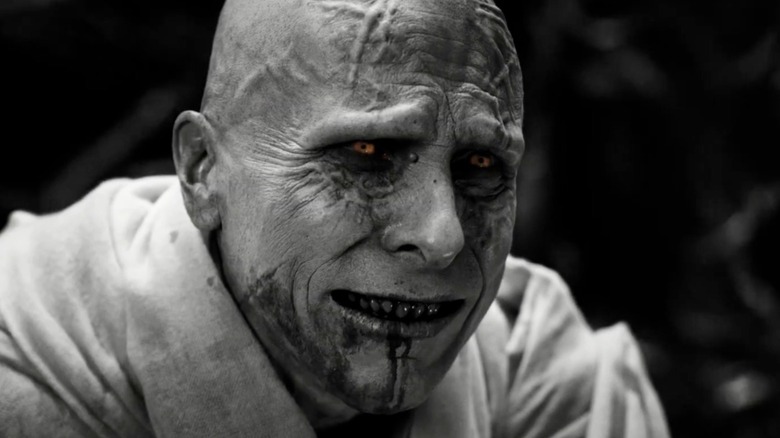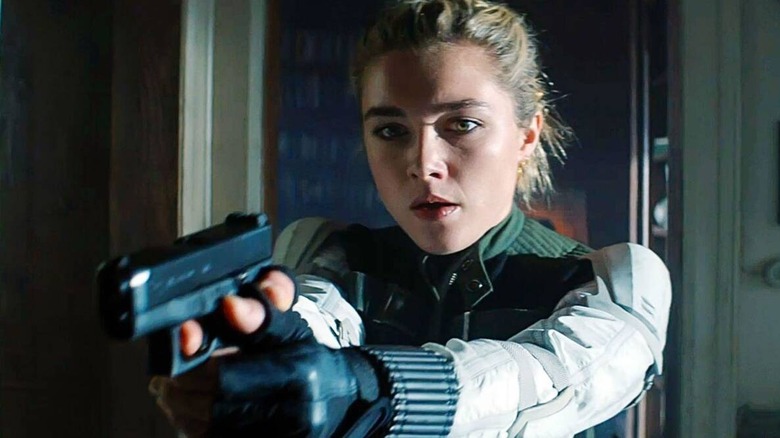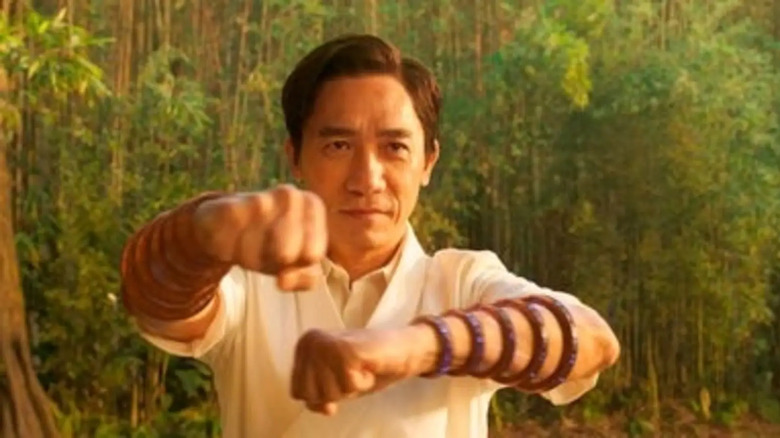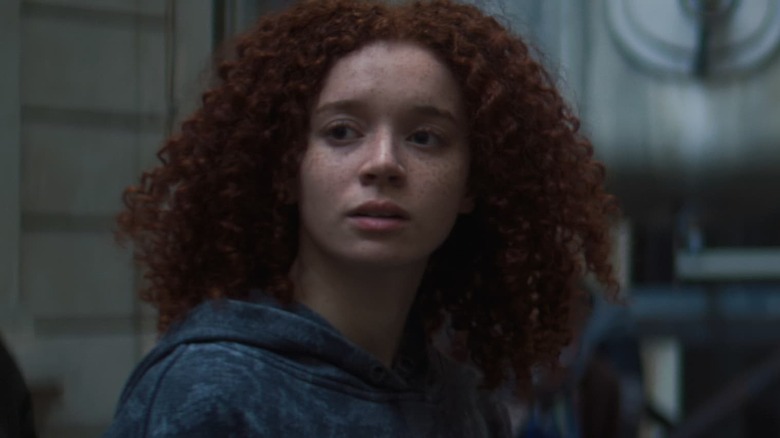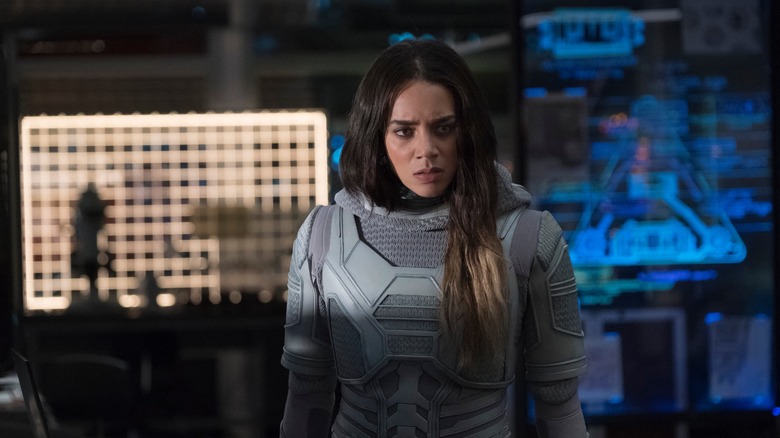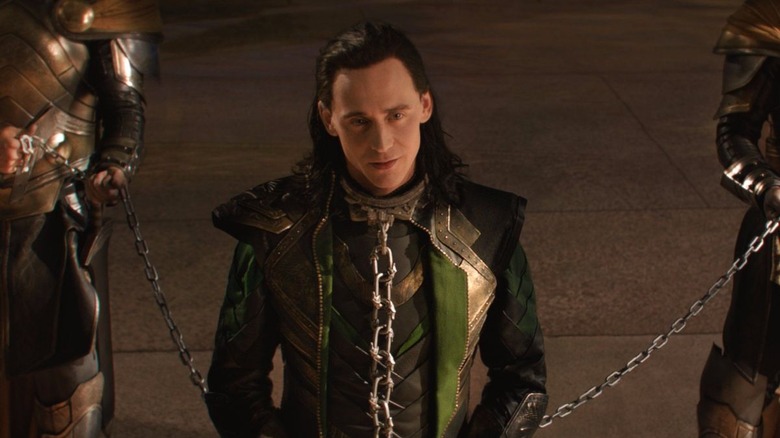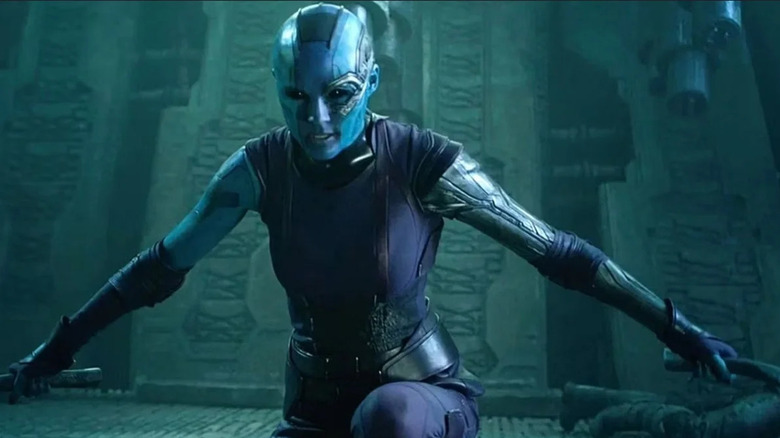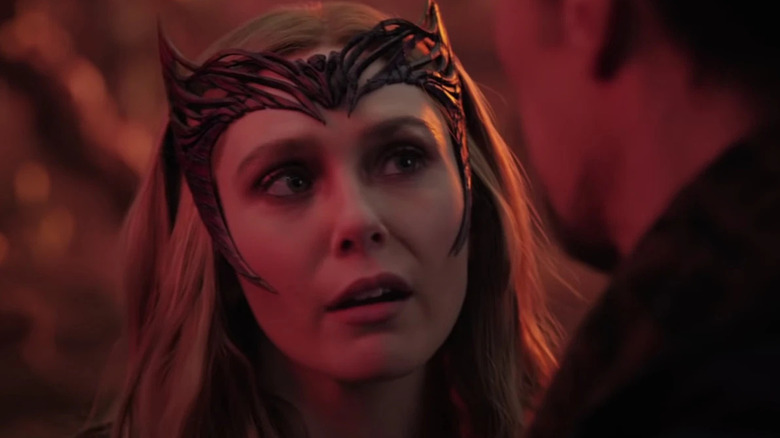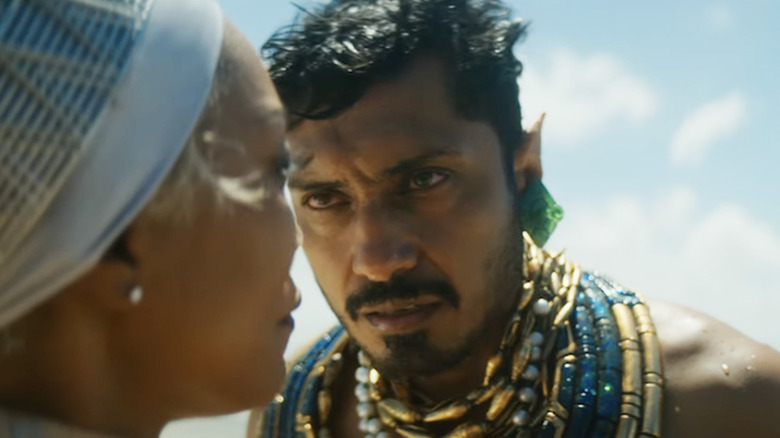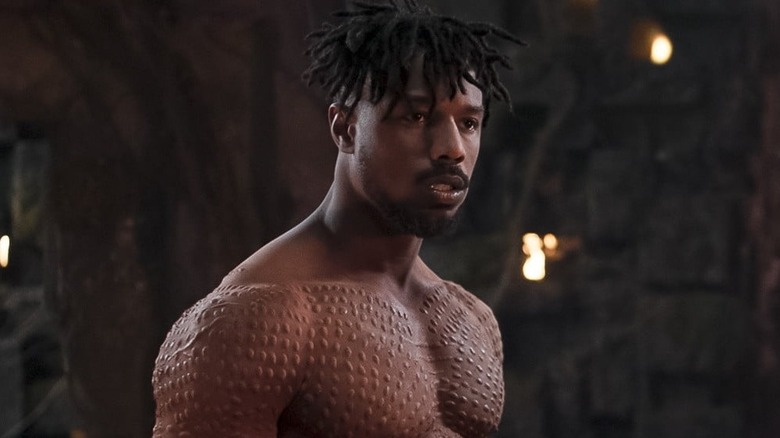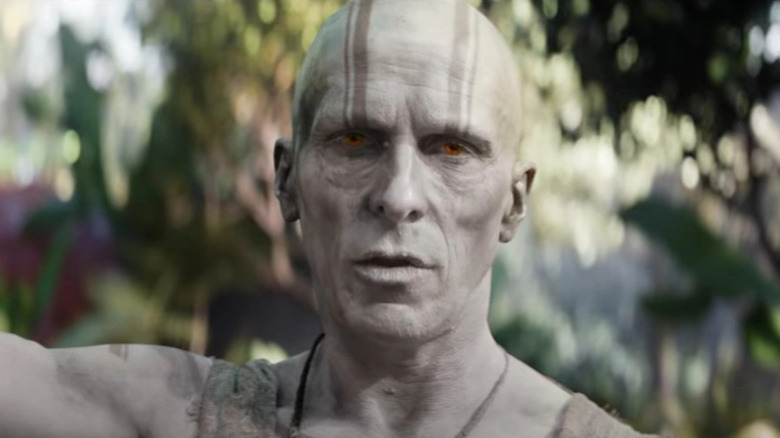The Most Heartwrenching Villain Backstories In MCU History
One reason superhero stories have remained popular over the last hundred years (and particularly at the box office the last two decades) is that they follow a time-tested formula. As the very name of the genre suggests, that formula involves a hero (or, increasingly, heroes) going up against a villain. Like other genres that revolve around protagonists and antagonists, many of these stories are simplistic, lacking nuance and depth. But, at various points throughout the 20th and 21st centuries, cultural shifts and changing tastes have challenged our conventional notions of right and wrong. Most often, the writers of these comic books and their film and TV adaptations accomplish this by providing the bad guy (or girl) with a heartbreaking backstory.
In the first phase of the Marvel Cinematic Universe, villains tended to be villains because they were more power-hungry than the heroes and willing to do more objectionable things to achieve their ends. Slowly, the MCU made the Avengers' adversaries less cartoonishly reprehensible and more interesting by giving them detailed pasts, rich inner lives, and sometimes even defensible opinions. This strategy was employed so often in Phases 2, 3, and 4 that by the time we meet the High Evolutionary in "Guardians of the Galaxy Vol. 3," it almost feels novel to hate a straightforwardly evil villain again. These 10 tragic, complex characters are the easiest to empathize with even as they're doing wrong — so much so that at times, we found ourselves rooting for them.
Yelena Belova
Yelena Belova (Florence Pugh) is, ostensibly, one of the villains in both 2020's "Black Widow" and 2021's "Hawkeye" series. She's also slated to appear in "Thunderbolts," production of which is currently on pause because of the WGA and SAG-AFTRA strikes. Yelena was a thorn in the sides of Natasha Romanoff, Kate Bishop, and Clint Barton, but with her laid-back attitude and snarky sense of humor, even the people she's been sent to kill can't help but warm up to her. She's not on this list because of her charisma, though. Yelena has nearly the same sad backstory as her superhero sister ... nearly because hers is even sadder.
Both girls were chosen by General Dreykov for his Black Widow assassin program and given to Alexei Shostakov and Melina Vostakoff to pose as a family in the United States. Yelena, the younger sister, was only 3 years old at the time and didn't understand the nature of her reality. With their mission compromised, the family was forcibly separated, at which point Yelena began training in the infamous Red Room. She became an incredible martial artist and weapons expert — but at an enormous cost. Potential Black Widows are subjected to sterilization and subliminal messages, resulting in control of their bodies and minds. Worse, training sessions are often fights to the death. A fellow former Widow eventually breaks the spell Yelena's under, but with freedom comes the pain of realizing what awful things she's done. She's also a victim of the blip and is devastated to learn that her beloved sister Natasha sacrificed herself so that she and others could return.
Xu Wenwu
Xu Wenwu (Tony Leung) is another terrific addition to the lineup of morally complicated MCU villains. In 2021's "Shang-Chi and the Legend of the Ten Rings," he's the titular hero's father. Literature is full of stories about daddy issues, but "Shang-Chi" takes the tensions between dad and son to another level. That's because Shang-Chi's pop is more than 1,000 years old, and — thanks to 10 bracelets (or rings) he wears on his forearms — he wields the power of a god. Wenwu doesn't start as a sympathetic character. In an opening montage, we see him leading his armies into battle and commanding his stealth force that, over centuries, changes the trajectory of human history at his whim. Having subjugated much of the known world, Wenwu endeavors to conquer the secret supernatural realm of Ta Lo. He finds it and one of its citizen protectors, Ying Li, who conquers him in hand-to-hand combat, then conquers his heart.
Wenwu gives up his armies, the Ten Rings, and eternal life to be with Ying Li, but the people of Ta Lo aren't willing to take a chance on the former warlord. The couple returns to the non-mystical world, has two children, and lives happily together until old rivals murder Ying Li. Her death drives Wenwu mad (which maybe proves the villagers right). He trains his son to become a killing machine, neglects his daughter, and thinks his wife is speaking to him from beyond the grave. The love between Xu Wenwu and Ying Li may have been real, but it wasn't powerful enough to absolve him of his past.
Karli Morgenthau
2021's "The Falcon and the Winter Soldier" had Baron Zemo, the Power Broker, and a rogue John Walker-slash-Captain America on its cast list, not to mention a former bad guy as the co-star. But Karli Morgenthau (Erin Kellyman) was positioned as the series' main antagonist. It was arguably clear from the start that Karli wasn't a top-tier MCU villain. The Flag Smashers leader is just a teenager with strong convictions (until Sharon Carter doses her up with Super Soldier Serum). That's not to suggest the acts of terrorism she commits aren't heinous. It just never really feels like she's much of a physical threat to Sam or Bucky. She is, however, one of the many late-era MCU villains who kind of has a point. And, like most adversaries who fit that description, her beliefs stem from her rough childhood.
Karli was an orphan raised by a woman known as Mama Donya. Following the blip (which Karli survived), Mama Donya took in other children left without parents after Thanos' snap. Of course, society was just as upended by the return of the blipped as it was when they disappeared. Karli lost her home and, eventually, her mother figure. Though there aren't right and wrong political answers to the situation, Karli is correct that countless people were displaced, and it's noble that she cares so much about refugees. But, as Sam tries to warn her, the Flag Smasher's methods are indefensible. In the end, she dies not for fighting what she believed in but because she was betrayed by those she trusted.
Ghost
Often, comic book villains have elaborate plans involving taking over Earth or even the galaxy. The villain in 2018's "Ant-Man and the Wasp" just wants to try to cure her peculiar medical condition. When Scott (Paul Rudd), Hank (Michael Douglas), and Hope (Evangeline Lilly) realize that Janet (Michelle Pfeiffer) might still be alive in the Quantum Realm, they endeavor to use their equipment to reach and rescue her. But, while Hope meets with black market businessman Sonny Burch (Walton Goggins) to procure a missing part, a masked figure with unusual skills arrives out of nowhere to steal the shrunken Pym lab. At first, it seems as though this ghost-like menace can phase in and out of solid matter at will. Then we learn that Ghost (Hannah John-Kamen) is actually Ava Starr, the daughter of Hank's old research partner who died during one of their experiments.
Not only did Ava lose her dad, she is a casualty of the test gone wrong, which renders her atomically unstable and causes constant excruciating pain. Ghost doesn't really want to be super, and she doesn't really want revenge, per se. She wears the suit because it helps her control her phasing, and she believes that by exposing herself to Janet's quantum energy, she might reverse the effects. Ava goes into true villain mode when she's willing to let Janet die so that she may live (at least, that's her hypothesis). But when Ant-Man and the Wasp prevail and Janet returns from the Quantum Realm, she heals Ava of her own accord.
Loki
At this point, it's a stretch to call Loki (Tom Hiddleston) a villain. The God of Mischief is one of the most popular characters in the MCU, having appeared in seven films and his own TV series, the second season of which is forthcoming. Still, Loki (or variants of Loki) have been antagonistic about as often as they've been agreeable. And of all of the MCU's villains, Loki has been subjected to an inordinate amount of suffering.
First, there's the fact that he's not really Asgardian. Loki's own father, the Frost Giant King Laufey, didn't want him, so Odin adopted him and raised him as a second son. His acute case of imposter syndrome is understandable. Loki believed he was a more worthy successor to his father since Thor didn't display the maturity necessary for leadership, so when he was passed over, he took the slight extremely personally. Over the years, he lost his mother, Frigga, and Odin. His much more evil sister Hela tried to kill him, and he's frequently been estranged from his brother, Thor, his closest confidant and constant competition. In "Avengers: Infinity War," Thanos strangles him to death (he'd appeared to be dead twice before in the MCU). Though that Loki really did die, death couldn't completely stop the God of Mischief, who escaped from a new time branch during the time heist in "Avengers: Endgame," only to be captured by the TVA.
But perhaps the hardest pill Loki has to swallow is that in his Disney+ series, he falls in love with himself (in the form of Sylvie) and gets rejected. This is one dysfunctional family of deities and one man at war with his own soul.
Nebula
Like Loki, we meet Nebula (Karen Gillan) as a morally questionable character and adopted sister of one of the protagonists in 2014's "Guardians of the Galaxy." Thanos' daughter and supposedly loyal henchwoman, Nebula is everything a compelling villain should be. She's angry, intimidating, relentless, powerful, and almost impossible to kill. That's because after he slew her parents and her Luphomoid people and essentially kidnapped her into his family, Thanos torturously trained her to be his right-hand warrior and replaced her body parts with cybernetics every time she lost a battle to her sister, Gamora. It's obvious to the viewer that the real axe Nebula has to grind is with her dad-slash-captor and not her green-skinned kin-slash-sparring partner. But, to go with her mutilated physique, Nebula has a crippling inferiority complex and a nihilistic view of the world.
As it turns out, Nebula hates Thanos just as much as Gamora and is just as eager to undermine him. While Gamora joins forces with the Guardians, Nebula partners with Ronan the Accuser. The two sisters are on-again-off-again enemies until the end of "Guardians of the Galaxy Vol. 2," when she pitches in to help the team defeat Ego. Thanos uses this vulnerability against her, however. He tortures her in order to force Gamora to reveal the location of the Soul Stone. As Phase 3 winds to a close, a reformed Nebula even goes so far as to kill an alternate version of herself to spare her sister and the Avengers' lives.
Scarlet Witch
Wanda Maximoff (Elizabeth Olsen) has a trajectory unlike any other character in the MCU. Throughout six films and one Disney+ series, she's a misguided victim, then a misunderstood hero, and finally a terrifying big bad. When we're introduced to her in 2015's "Avengers: Age of Ultron," she and her twin brother Pietro aren't villains so much as obstacles the Avengers must overcome. They have been subjected to Baron Wolfgang von Stryker's experimentation with the Mind Stone-containing scepter, which respectively bestows them with super speed and psionic powers. Ultron easily convinces the twins to align with him, as the Maximoffs blame Tony Stark for their parents' death.
Wanda's tragic backstory is that while growing up in war-torn Sokovia, her parents were killed when a bomb destroyed their apartment (Wanda sees a mortar shell bearing the Stark Industries logo nearby). She and her brother were only 10 years old at the time, and they spent the next five years as political protestors, unaware that Hydra operatives were grooming them. After they see the light and switch sides, Pietro is shot during a valiant rescue effort. Wanda becomes an Avenger but is haunted by her brother's death.
Unfortunately, the MCU's Quicksilver isn't the last loved one Wanda loses. Scarlet Witch also says goodbye to Vision (three times) and their twin sons. Traumatically, Wanda pries the Mind Stone from Vision's forehead to prevent Thanos from attaining it, but because of the Time Stone, she's forced to relive the scene. In 2021's "WandaVision," her husband and children disappear when she gives up her self-created and controlled fantasy world, the Hex.
Namor
The version of Namor the Sub-Mariner that has long existed in Marvel Comics is often cited as one of the first real antiheroes. That's also how he's portrayed in 2022's "Black Panther: Wakanda Forever," though some key details have been changed. The MCU's Namor (Tenoch Huerta) is the ruler of the Mesoamerican underwater kingdom of Talokan, not Atlantis. This update makes his origin story more culturally specific and resonate in the modern era. Namor was born to an indigenous woman in the late 16th century, just as Spanish conquistadors invaded his people's shores. While pregnant, his mother ingested a blue plant so that she might hide underwater; this mutated her child in utero, and Namor was born with unique physical traits and abilities like winged feet with which he could fly and nearly impenetrable waterproof skin.
That his tribe was driven into the sea is an obvious metaphor for colonialism and genocide. Before Namor would come to be worshipped as the feathered serpent god and take on the colonizers, he was just another kid with a dead parent. His mother wished to be buried on land, and a young Namor obliged. But when he got to the surface, he saw the real horrors of European conquest: pillaging and slavery. After everything he'd been through, no one could blame Namor for being fiercely protective of Talokan, but he's become nearly as ruthless as the historical villains who oppressed his people in the first place.
Killmonger
There's a dark running joke in the MCU that some citizens believe Thanos was right, but arguably no MCU villain thus far is more right than Erik Killmonger (Michael B. Jordan), the main antagonist in the first "Black Panther" film. As a youth, Erik Stevens lives with his father in Oakland, California. N'Jobu told his son (whose Wakandan name is N'Jadaka) about Wakanda and promised to take him someday. But the ex-patriot prince was secretly planning to make Wakandan technology available to the rest of the world's Black population, against the wishes of his brother, the King. T'Chaka impales N'Jobu with his panther claws for this crime, leaving Erik an orphan with a vendetta and a new worldview. Eventually, he becomes a Navy SEAL and the military's most efficient marksman, giving himself a scar each time he makes a kill.
Killmonger's grievances are many, and most of them are pretty justifiable. T'Chaka abandoned him — a Wakandan prince in his own right — in California, knowing there'd be no one to care for him. When he returns to Wakanda, he confronts the council about how they're only concerned with protecting their own borders while two billion people of African descent have struggled socially and geopolitically. "Black Panther" is, at its core, a thoughtful story that weighs the merits of isolationism against the merits of interventionism. Killmonger favors the well-being of the many over the prosperity of the few, even if that means global war. When he challenges T'Challa, he does so in accordance with the nation's custom of ritual combat. But the difference between T'Challa and N'Jadaka is that the former is calm, humble, and willing to learn, while the latter falls victim to his arrogance and righteousness.
Gorr the God Butcher
2022's "Thor: Love and Thunder" was divisive among the MCU's fandom. Some audience members felt that writer-slash-director Taika Waititi took the comics' extremely dramatic source material and leaned too much into his trademark screwball comedy. There were also complaints that Gorr the God Butcher (Christian Bale) didn't kill many gods on screen. But Waititi's more humanoid conceptualization of Gorr and Bale's characteristically intense and committed performance combine to give this villain the most heartbreaking backstory in the entire franchise.
Many MCU villains lose somebody or something, which sets them on a path toward vengeance. Gorr loses everything: his home world, his people, his family (culminating in the devastating death of his daughter in his arms), and finally, his faith. When he realizes his hedonistic god Rapu has been completely oblivious to his people's suffering, he vows to get retribution against the universe's deities on behalf of its small folk. Armed with (and corrupted by) the Necrosword, Gorr butchers his own god, then sets off to slay the rest.
What we know of gods from the MCU (Ego, for example), and what we see of the gods assembled to party and protect themselves at Omnipotence City (in particular, Zeus) doesn't exactly prove Gorr wrong. We can't condone kidnapping kids and using them as god bait. Still, in the end, rather than wipe out all of existence's immortals, Gorr gives his daughter another chance at a mortal life before his own time runs out only moments later.
